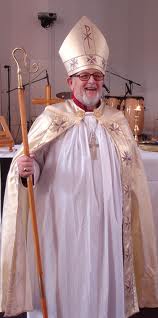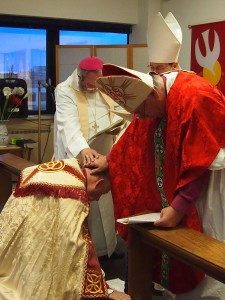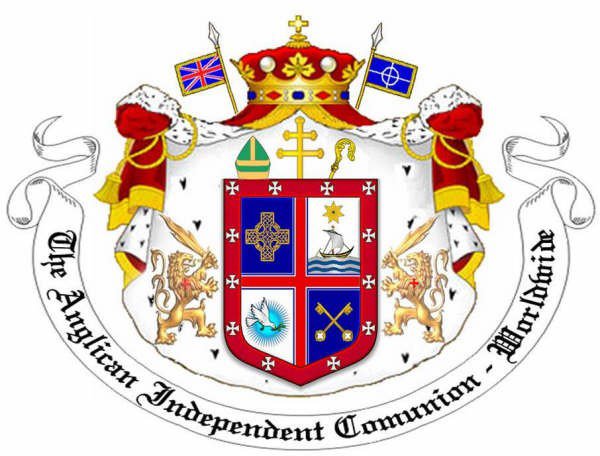
An Introduction to
The Anglican Independent Communion
By
The Most Rev’d. Dr. Norman S. Dutton
C.J., (Hon) D.D., (Hon) Th.D.
Metropolitan Archbishop Emeritus
The late Bishop, The Rt. Rev’d. Dr. Peter A. Compton-Caputo founded the Anglican Independent Communion, in 1997. It now has Provinces in the United States of America, British Isles, Europe, Caribbean, Latin America, West Africa, East Africa, India, Australia and Pakistan, making it the largest “continuing” Anglican Communions in the world, outside the control of “The Anglican Communion” under the leadership of Archbishop of Canterbury.
Bishop + Peter was born in 1934 in Manhattan, and attended schools in that City before enlisting in the United States Air Force in 1951, serving with them for the next 5½ years, after which he became a serving Police Officer in Grand Rapids in the State of Michigan.
+ Peter later went into local government work, and held posts in Ypsilanti, in the State of Michigan, New York State, Pennsylvania and New Hampshire.
+ Peter’s career in the church began in Schenectady, New York, where he was, after a period of training, Ordained as a Deacon in the Protestant Episcopal Church of the United States, in January 1977. It was some time later that he was made a Priest, giving as his reason for the delay, that he was enjoying the job of a Deacon so much, that he did not want the problems and responsibilities that came with the Priesthood and running a parish, to quote him “all the fun without the responsibility”.

Being a traditionalist, + Peter watched with despair as the Episcopal Church, abandoned biblical morality and surrendered slavishly to political correctness, and the downgrading of the place of the sacraments in the worship of the church, and worst of all, the steady undermining of the very belief in Christianity as a revealed faith, and then being expected to standby and watch the complete surrender of the church which he loved, to the shrill demands for Priestesses, this proved a step too far for + Peter, who said “enough is enough” and along with many other like minded clergy, distanced himself from the heresies of PECUSA.
+ Peter then moved to England and was appointed by the Church of England as a Non-stipendiary Curate in the Parish of St. Peter’s, Meavy, in the County of Devon, which he held for a period of time before returning to the United States.
On his return + Peter entered an Anglican Franciscan Monastery, taking Orders as a Monk, but, in 1985 he was called out by the Presiding Bishop, and sent to Annapolis in Maryland, to found a fledgling congregation as part of the Traditional Episcopal Church. Arriving in the district, + Peter, not only had to recruit a congregation, but also had to find somewhere to hold his services, in this respect, he was led to a small disused Chapel located at the junction of Generals Highway and Crownsville Road, in Crownsville, which he was able to purchase from its owners, with the help of his friends. * This is the historic Church of St. Paul, which later became his Episcopal seat, when in 1993 + Peter was Consecrated as a Bishop within the Traditional Episcopal Church.
In 1997 the Congregation and Vestry of St. Paul’s Church voted to withdraw from this group as a result of problems within it, which had occurred. And so The Anglican Independent Communion was born, + Peter was then joined by a number of other disillusioned congregations throughout the United States and elsewhere.
In a real sense The Anglican Independent Communion, was a Continuing Church, not a new Church. It continues to believe in everything the Church of England and the Protestant Episcopal Church of the United States accepted and taught before they were swamped and strangled by liberalism. That is why it called itself a “Traditional Church”.
In particular, it holds to the Holy Bible as God’s inspired Word and to the Book of Common Prayer, the Ordinal and the 39 Articles of Religion, as containing reliable summaries of our Faith. It holds to the seven Sacraments of the Church, Holy Baptism, Confirmation, Holy Eucharist, Holy Matrimony, Holy Orders, Penance and Unction of the Sick and Dying. The Church affirm the necessity of Baptism which brings us “Into Christ” and is completed by the laying on of hands at Confirmation and the Eucharist which unites us to the Sacrifice of Christ Jesus and through which He feeds us with His Body and Blood.
This Church holds to the Holy Orders of Bishops, Priests and Deacons, in a valid Apostolic Succession, and it believes that in accordance with the teachings of Holy Scripture and Church Tradition, that all who hold these Orders must be men of high moral character.
In July 2001 + Peter, invited The Rt. Rev’d. Dr. Norman S. Dutton, who had been consecrated as Bishop in Anglia (England) at St. Paul’s Crownsville, in 1999 to accept the vacant position of Co-adjutor Bishop (+Peter’s designated successor), a position that he accepted with some reluctance due to the distance between England and the United States, however due to the poor state of +Peter’s health, +Norman finally agreed.
A few short weeks later on the 15th August 2001 + Peter was called to higher service as a result of complications directly associated with the diabetic condition which had plagued him for many years, + Peter was laid to rest in the Cemetery at his beloved St. Paul’s Chapel.
Following the passing of Bishop + Peter, conversations took place between the Bishops of the Communion, and it was agreed that subject to the approval of the Churches and Clergy, that the Communion should be divided into separate Provinces for ease of administration.
At the Clericus of the Province of the British Isles & Europe, held at St. Raphael’s Church, Moseley, Birmingham, England on All Saints Day, the First day of November in the year of our Lord 2003 by a clear majority of the clergy present, it was agreed that the title of “Presiding Bishop”, which was the cause of some confusion to people outside the Communion, should be changed to that of “Metropolitan Archbishop”, and The Most Rev’d. Dr. Norman S. Dutton was duly elected and installed as the first Metropolitan Archbishop of the Communion, on the same day.
+ + Norman’s appointment as Metropolitan Archbishop, was fully recognised by all the other Provinces, who acknowledged him as the titular head of The Anglican Independent Communion – Worldwide as the lawful successor to Bishop Peter.
The Anglican Independent Communion – Worldwide, is an Anglican Communion both by doctrine and worship, it is committed to the traditional liturgy of the Anglican Church as contained in the Book of Common Prayer, and to the use of the Authorised King James version of the Holy Bible in public worship.
The Communion is only “Independent” from the present heresies that have infected the Church of England, and the Protestant Episcopal Church of America. It is not “Independent” from the One Holy Catholic and Apostolic Church, which is the Body of our Lord and Saviour Jesus Christ, here on earth.
The Ordinations and Consecrations of our Bishops, Priests and Deacons are a continuation of valid and lawful lines of Apostolic Succession, and are directly descended from all five of the Ancient Patriarchal Sees, Jerusalem, Antioch, Rome, Alexandria and Constantinople, which we believe, contribute to the spiritual authority of our Communion.

The Most Rev’d. Dr. Norman S. Dutton retired from the office of Metropolitan Archbishop of The Anglican Independent Communion -Worldwide in June 2007 so he could create the Anglican Episcopal Communion International.
In 2011, because he was a Spanish-speaker from Chile, +Jorge Rodriguez Escobar was elected Metropolitan Archbishop, but chose to be referred to as Primus Arzobispo or Primate Archbishop. When +Jorge decided to abdicate in July 2013, he decreed that +Clive Read, Archbishop of Europe, should replace him, in an Investiture in Milton Keynes, attended by a much wider group of clergy and witnesses than would have been the case with a ceremony in Javea.
Episcopal Anglicans talk of their ‘Apostolic Succession’ which is like a ‘family tree’ that traces back their connection to a Disciple, in the ‘laying-on-of-hands’ by a continuous line of Bishops (the current term for Pastor, Elder or Bishop). Clive’s Apostolic Succession is traced back to Peter, James and John.
